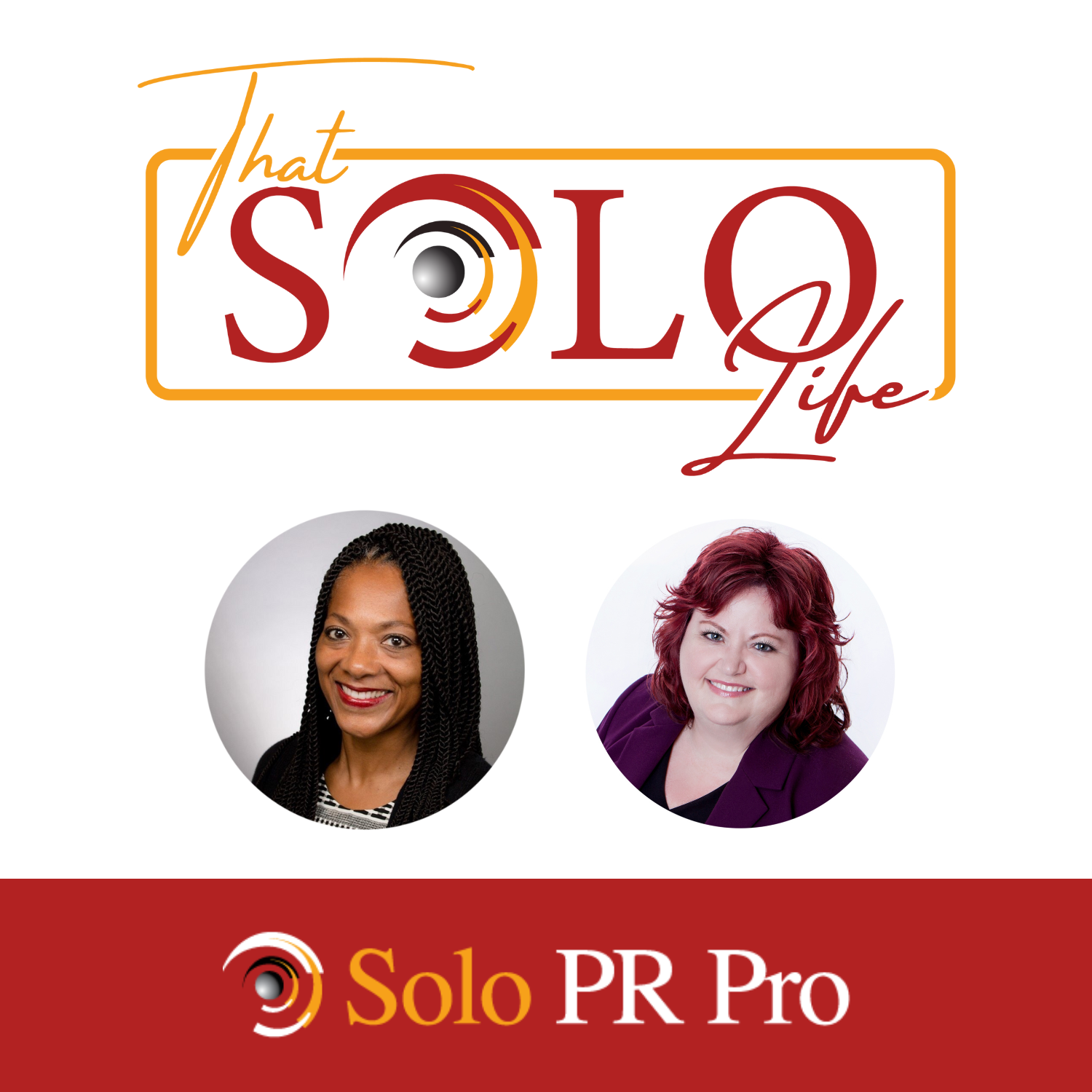
31.2K
Downloads
332
Episodes
That Solo Life: Co-hosted by Karen Swim, founder of Words for Hire, LLC and owner of Solo PR Pro and Michelle Kane, founder of VoiceMatters, LLC, we keep it real and talk about the topics that affect solo business owners in PR and Marketing and beyond. Learn more about Solo PR Pro: www.SoloPRPro.com
That Solo Life: Co-hosted by Karen Swim, founder of Words for Hire, LLC and owner of Solo PR Pro and Michelle Kane, founder of VoiceMatters, LLC, we keep it real and talk about the topics that affect solo business owners in PR and Marketing and beyond. Learn more about Solo PR Pro: www.SoloPRPro.com
Episodes
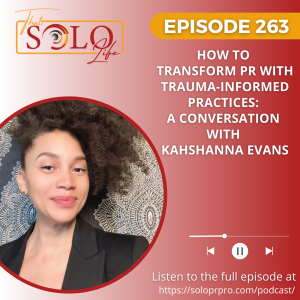
Monday Aug 26, 2024
How To Transform PR With Trauma-Informed Practices with Kahshanna Evans
Monday Aug 26, 2024
Monday Aug 26, 2024
That Solo Life, Episode 263: How To Transform PR With Trauma-Informed Practices with Kahshanna Evans
In this Episode
In this episode of "That Solo Life," co-hosts Karen Swim and Michelle Kane are joined by the passionate and inspiring Kahshanna Evans, a senior strategist at Kissing Lions Public Relations. Kahshanna's expertise lies in community building through communication strategy, corporate social responsibility, and trauma-informed communications management.
Kahshanna shares her journey into the trauma management space, highlighting her background in fashion, film, and television before delving into transformational well-being studies. Her lightbulb moment came during a trauma-informed outreach program, leading her to focus on trauma-informed practices and awareness.
The conversation delves into the importance of trauma-informed communications in various sectors, including crisis communications, corporate social responsibility, and media literacy. Kahshanna emphasizes the need for a shift towards person-first language and humanizing narratives, especially in historically targeted communities.
The episode explores Kahshanna's community building communication strategy, which integrates trauma-informed practices, media literacy, and the empowerment of historically marginalized communities. The hosts discuss the role of solo PR professionals as activists and educators, advocating for change and inclusivity in the industry.
Listeners are encouraged to engage with Kahshanna through Kissing Lions' website or LinkedIn, and to join the solo PR community for further discussions and collaborations. The episode concludes with a call to action for professionals to embrace trauma-informed practices and work together towards transformative change in communications and beyond.
About Kahshanna Evans
Kahshanna Evans brings her passion for community building through communications strategy, corporate social responsibility (CSR), and uniting people through stories to her role of Senior Strategist at Kissing Lions Public Relations, Trauma Informed Resilient Communities Consultant—and as a New York State Trauma Informed Network and Resources Center (TINRC) Advisory Council Member. Kahshanna has been a leading strategic thinker in various industries, including wellness, communications, nonprofit, and professional services. During her tenure at a nonprofit that educates the public and private sector on PACEs science, Kahshanna served as a subject matter expert, organizational spokesperson, and facilitator of trauma-informed (TI) training for various communities. As a founding member of a Diversity, Equity, Belonging, Inclusion & Allyship (DEIB/A) committee at a wellbeing tech company, Kahshanna played a role in advocating for the creation of a culture of belonging.
Episode Timeline
00:00:00 - Introduction to Kahshanna Evans
00:03:20 - Importance of Trauma-Informed Communications
00:05:51 - Crisis Communication and Trauma-Informed Practices
00:13:11 - Overcoming Politicization of Trauma
00:18:25 - Community Building Communication Strategy
00:23:29 - Transforming the Industry through Trauma-Informed Practices
00:30:58 - Emphasizing Community Support and Collaboration
Resources:
- Kahshanna Evans article (chock full of resources): The Future of Corporate Citizenship: Can Solo PR Pros Introduce A Trauma Informed World View?
- Study: From managing emotion to trauma‐informed management: A new direction in crisis communication
- Victims as stakeholders: Insights from the intersection of psychosocial, ethical, and crisis communication paths
Enjoyed the episode?
Please leave a review here - even a sentence helps. Share and tag us (@SoloPR, @SoloPRPro) on social media so that we can thank you personally! Your support helps us keep bringing you insightful content every week. Thank you for tuning in!
Say Thanks to Kahshanna Evans!
If you liked this episode with Kahshanna, please say thanks on LinkedIn!
Listen to the episode on our website, Apple Podcasts, Spotify, Amazon Music, or on your favorite podcast platform. You can also watch the interview on YouTube here.

Monday Aug 19, 2024
Establishing and Proving the Value of Public Relations
Monday Aug 19, 2024
Monday Aug 19, 2024
That Solo Life Episode 262: Establishing and Proving the Value of Public Relations
In this Episode
In this episode of "That Solo Life," co-hosts Karen Swim, APR and Michelle Kane discuss the ongoing challenge of establishing and proving the value of public relations work to clients. Independent PR professionals must navigate the complexities of demonstrating the impact of their efforts in a landscape where marketing, advertising, and PR often get lumped together.
The hosts discuss the importance of metrics and measuring the success of PR campaigns, especially in times of economic uncertainty where clients may be more focused on immediate revenue generation. They emphasize the distinction between PR and marketing, highlighting the nuanced ways in which PR professionals contribute to a company's bottom line.
Throughout the episode, Karen and Michelle share personal experiences and insights on how to effectively communicate the value of PR to clients. They stress the need for open and candid conversations about goals, success metrics, and the evolving needs of the client's business. The hosts acknowledge the challenges of navigating client expectations and the pressure to deliver tangible results in a competitive market.
As the conversation unfolds, the hosts encourage PR professionals to hone their measurement skills, delve into data analytics, and craft compelling narratives that showcase the impact of PR efforts on business outcomes. They underscore the importance of continuous learning, adaptation, and proactive communication to build trust and credibility with clients.
In conclusion, Karen and Michelle urge listeners to stay resilient, proactive, and focused on delivering value in a rapidly changing industry. They invite feedback and shared experiences from the audience, emphasizing the collective learning and growth within the PR community. The episode serves as a reminder of the ongoing journey to elevate the role of PR professionals and demonstrate their indispensable contribution to business success.
Episode Timeline
- 00:02:02 - Establishing and Proving the Value of PR
- 00:05:16 - Focus on PR and Marketing Value
- 00:07:01 - Conversations about Goals and Success
- 00:09:35 - Adapting to Client Needs and Market Changes
- 00:10:51 - Navigating Sales-Driven Organizations
- 00:12:41 - Understanding Client Perspectives and Decision Making
- 00:13:33 - Importance of Measurement and Metrics
- 00:14:30 - Conclusion and Call for Better Storytelling
Enjoyed the episode?
Please leave a review here - even a sentence helps. Share and tag us (@SoloPR, @SoloPRPro) on social media so that we can thank you personally! Your support helps us keep bringing you insightful content every week. Thank you for tuning in!
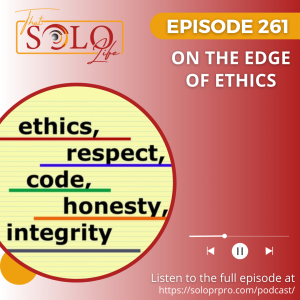
Monday Aug 12, 2024
On the Edge of Ethics
Monday Aug 12, 2024
Monday Aug 12, 2024
That Solo Life Episode 261: On the Edge of Ethics
In this Episode
Has being edgy gone too far? In today’s episode of That Solo Life podcast, Karen Swim, APR and Michelle Kane discuss the controversial topic of sensationalized headlines and the impact they have on the dissemination of accurate information. The hosts discuss the fine line between grabbing attention and misleading the audience, especially in today's media landscape where clickbait headlines are prevalent.
Karen and Michelle discuss a recent example of the Olympics and the false narrative surrounding a boxer from Algeria to highlight how sensationalized headlines can lead to misinformation and even incite hatred towards individuals. They emphasized the ethical responsibility of PR professionals and journalists to present accurate and fair information to the public.
Public Relations professionals should all be concerned about the current trend of compromising truth for entertainment value in news reporting. The hosts reflected on the implications of this trend on future generations, particularly in an era where social media and instant information sharing can lead to the rapid spread of misinformation.
This episode also touched on the importance of self-reflection and avoiding biases in communication strategies, urging Solo PR Pros to stay honest and forthright in their work.
Overall, this episode served as a thought-provoking discussion on the evolving landscape of media, the importance of ethical journalism, and the role of PR professionals in upholding truth and accuracy in communication.
Episode Timeline
- 00:00:00 - Introduction and Discussion on Provocative Headlines
- 00:05:30 - Impact of Misinformation and Ethical Responsibility
- 00:09:06 - Concerns about Younger Generations and News Consumption
- 00:12:05 - Compromising Truth for Entertainment
- 00:13:35 - Challenges of Different Versions of Truth
- 00:15:04 - Encouragement for Self-Reflection and Audience Engagement
- Enjoyed the episode?
Please leave a review here - even a sentence helps. Share and tag us (@SoloPR, @SoloPRPro) on social media so that we can thank you personally! Your support helps us keep bringing you insightful content every week. Thank you for tuning in!
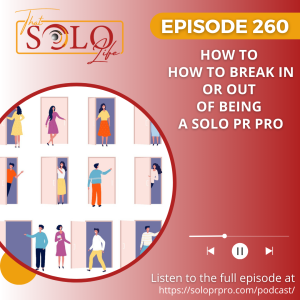
Monday Aug 05, 2024
How To Break In or Out of Being a Solo PR Pro
Monday Aug 05, 2024
Monday Aug 05, 2024
That Solo Life Episode 260: How To Break In or Out of Being a Solo PR Pro
In this Episode
Do you want to make the leap to being a Solo PR Pro? Or are you a Solo longing for the steady rhythm and challenge of an in-house job? In today’s episode of "That Solo Life," co-hosts Karen Swim, APR and Michelle Kane discuss diving in or out of being a Solo P Pro.
Life is not stagnant and that applies to your PR career. We all navigate different seasons of life and our career aspirations and capacity may evolve to fit that season. Decades ago, consulting or freelancing was seen as a temporary measure between jobs. Today, it is rightly recognized as a legitimate career path offering control and flexibility. This shift in the perception of solo work makes it easier to move in and out of working for yourself and working n-house.
In the episode, Karen and Michelle discuss the factors to consider when contemplating a shift between solo work and traditional employment. Michelle emphasizes the need for self-motivation, financial preparedness, and a clear understanding of market demand when venturing into solo work. Karen stresses the significance of intentional networking and skill development for those considering a return to in-house positions.
Throughout the episode, the hosts emphasize the importance of aligning work with personal fulfillment and the freedom to pursue different paths based on individual needs and desires. They encourage listeners to share their experiences and questions, inviting engagement and feedback for future episodes.
Listeners are encouraged to visit the soloprpro.com website to connect with the hosts and share their stories. The episode concludes with a call to action for sharing and reviewing the podcast to support its growth and reach.
The episode is a great reminder that public relations professionals can build a career customized to their needs and aspirations, adjusting it along the way to fit the fluidity of their lives.
Episode Timeline
- 00:00:00 - Introduction and Midsummer Stride: Michelle and Karen discuss the midsummer season and ignore the back-to-school rush.
- 00:05:30 - Evolving Attitudes Towards Consulting: Karen reflects on the evolution of consulting from a stopgap measure to a career choice.
- 00:09:27 - Flexibility in Career Choices: Michelle and Karen emphasize the importance of flexibility in transitioning between solo work and in-house positions.
- 00:12:33 - Networking Strategies: Karen provides insights on networking strategies for transitioning between solo work and in-house positions.
- 00:15:23 - Pursuing Fulfillment: Michelle and Karen discuss the balance between pursuing fulfilling work and jobs that provide stability and benefits.
Enjoyed the episode?
Please leave a review here - even a sentence helps. Share and tag us (@SoloPR, @SoloPRPro) on social media so that we can thank you personally! Your support helps us keep bringing you insightful content every week. Thank you for tuning in!

Monday Jul 29, 2024
How To Keep Your Head When Everyone Is Losing Theirs
Monday Jul 29, 2024
Monday Jul 29, 2024
That Solo Life Episode 259: How To Keep Your Head When Everyone Is Losing Theirs
In this Episode
Today’s episode of "That Solo Life," features an honest discussion about the challenges of the modern workforce and how Solo PR Pros can successfully navigate the toxicity and stress that has become all too prevalent.
Corporate employees are faced with overwhelming demands and pressures -from mandatory office returns to being burdened with more work and fewer people - the landscape is filled with challenges that impact not only employees but also independent consultants that serve these organizations.
Karen and Michelle emphasize the importance of self-care and setting boundaries in the face of workplace toxicity. They address the need to prioritize mental well-being, streamline work schedules, and find activities that bring joy and renewal. By focusing on doing good work and avoiding getting entangled in office politics, we can maintain a healthier balance and preserve our energy.
Throughout the episode, the hosts share personal experiences and insights on how to handle difficult situations with clients and colleagues. They stress the significance of recognizing what we can control and letting go of what we cannot, especially when faced with internal power struggles and conflicts.
Listeners are encouraged to prioritize their well-being, stay positive, and remain focused on their work amidst external stressors.
Please join us for more discussions on "That Solo Life" and remember to share your stories and feedback with us at soloprpro.com. Thank you for tuning in, and until next time, take care and stay resilient in the face of life's challenges.
Episode Highlights
- Navigating Work Challenges : 00:00:52-00:01:24
- Challenges of Detachment : 00:01:39-00:01:49
- Strategies for Self-Care : 00:04:25-00:05:18
- Importance of Boundaries : 00:05:18-00:05:29
- Finding Joy and Renewal : 00:06:03-00:07:49
- Maintaining Focus on Good Work : 00:08:02-00:09:44
- Dealing with Toxicity : 00:10:05-00:10:36
- Setting Boundaries and Prioritizing Self : 00:11:05-00:11:16
- Maintaining Positive Attitude : 00:13:37-00:13:48
Enjoyed the episode?
Please leave a review here - even a sentence helps. Share and tag us (@SoloPR, @SoloPRPro) on social media so that we can thank you personally! Your support helps us keep bringing you insightful content every week. Thank you for tuning in!
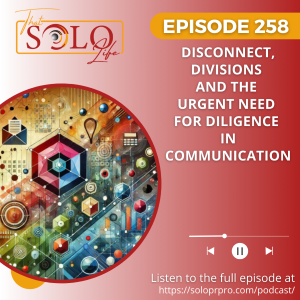
Monday Jul 22, 2024
Disconnect, Divisions and the Urgent Need for Diligence in Commmunication
Monday Jul 22, 2024
Monday Jul 22, 2024
That Solo Life Episode 258: Disconnect, Divisions and the Urgent Need for Diligence in Communication
In this Episode
In this episode of "That Solo Life," co-hosts Michelle Kane and Karen Swim, APR tackle the profound impact of words in communication, particularly for PR and marketing professionals.
The conversation turns to the ethical considerations of communication, with both hosts highlighting the power and responsibility that come with crafting messages. They stress the significance of using words to inspire positive actions and foster connections, especially in a time marked by detachment and distrust in institutions. Karen and Michelle acknowledge the complexities faced by communicators in navigating a landscape where extremism and polarization are prevalent.
As the discussion unfolds, Michelle and Karen underscore the role of communicators in promoting inclusivity and equity through their messaging. They challenge the misconception that inclusive communication is a form of coddling, emphasizing that it requires skill and empathy to reach diverse audiences effectively. Despite the challenges posed by social media algorithms and societal divisions, the hosts express optimism about the transformative potential of ethical communication practices.
In a call to action, the hosts encourage listeners to prioritize self-care and seek joy outside of their professional roles to maintain mental well-being. They emphasize the importance of community support among communicators and invite listeners to share their experiences and insights. The episode concludes with a reminder to share the podcast with fellow professionals and engage with the hosts on social media platforms.
Listeners are left with a renewed sense of purpose and a deeper appreciation for the impact of words in shaping narratives, fostering connections, and driving positive change in the world of communication. "That Solo Life" continues to serve as a platform for meaningful discussions and insights for PR pros and marketers navigating the evolving landscape of communication.
Episode Timeline:
- 00:03:24 - The Power of Words and Ethical Communication
- 00:06:06 - Impact of Detachment and Extremism on Communication
- 00:10:54 - Challenges in Communication Amidst Social Isolation
- 00:12:16 - Optimism and Commitment to Ethical Communication
- 00:14:24 - Recognizing the Importance and Responsibility of Communication
- 00:15:19 - Encouragement for Self-Care and Community Support
Episode Resources:
- Fortune Article: Welcome to ‘The Great Detachment’: Workers are checked out—and so are their bosses
- Heat’s Impact on the Brain:
Enjoyed the episode?
Please leave a review here - even a sentence helps. Share and tag us (@SoloPR, @SoloPRPro) on social media so that we can thank you personally! Your support helps us keep bringing you insightful content every week. Thank you for tuning in!
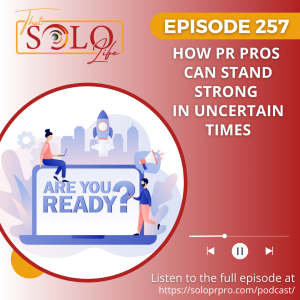
Monday Jul 15, 2024
How PR Pros Can Stand Strong in Uncertain Times
Monday Jul 15, 2024
Monday Jul 15, 2024
That Solo Life, Episode 257: How PR Pros Can Stand Strong in Uncertain Times
In this Episode
The practice of public relations is not for the faint of heart. Whether you are in-house or running your own shop, the work can be challenging. For Solo PR Pros, the challenges extend to ensuring that they sustain their livelihood while serving others. In today’s episode Karen Swim, APR and Michelle Kane, discuss the importance of protecting yourself and your business during times of instability.
Instability seems to be the new normal. The economy, political landscape, and climate are just a few of the many things that currently have us feeling like we are doing life on a wobble board.
As PR professionals, we recognize the need to be proactive in safeguarding our businesses. Michelle and Karen emphasize the importance of future-proofing our skills and staying ahead of industry trends. Adapting to changing client needs and exploring new service offerings are key strategies to weathering uncertain times.
The conversation delves into the evolving landscape of journalism and media relations, highlighting the challenges faced by professionals in these fields. The discussion turns to the impact of sensationalism and the decline of ethical journalism on public trust and the industry as a whole.
Despite the challenges, listeners are encouraged to stay engaged and seek opportunities for growth and innovation. By staying informed, adapting to change, and focusing on serving our audiences, we can navigate through the current malaise in the PR world.
Episode Timeline:
00:00:18 - Introduction to the Podcast
00:01:05 - Acknowledging Instability in the World
00:03:49 - Importance of Proactivity in Business
00:05:10 - Importance of Upskilling and Future-Proofing
00:07:07 - Paying Attention to Industry Trends
00:08:26 - Embracing Change and Career Shifts
00:10:55 - Concerns about Journalism Integrity
00:12:15 - Impact of Decline in Creative Arts
00:13:07 - Encouragement to Share and Connect
Enjoyed the episode?
Please leave a review here - even a sentence helps. Share and tag us (@SoloPR, @SoloPRPro) on social media so that we can thank you personally! Your support helps us keep bringing you insightful content every week. Thank you for tuning in!
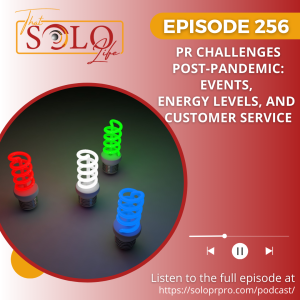
Monday Jul 01, 2024
PR Challenges: Post-Pandemic - Events, Energy Levels, and Customer Service
Monday Jul 01, 2024
Monday Jul 01, 2024
That Solo Life, Episode 256: PR ChallengesPost-Pandemic : Events, Energy Levels and Customer Service
In this Episode
In this episode, Karen Swim and Michelle Kane, discuss the various challenges and changes that the post-pandemic era has brought to the PR industry.
The pandemic had a significant impact on in-person events and interactions. The hosts discuss how shifting priorities, increased workloads, and changing interests have made it challenging to plan and attend events, leading to a reevaluation of traditional event strategies.
Karen and Michelle also touch upon the shift in energy levels post-pandemic, noting how many individuals feel more fatigued and less productive despite technological advancements. The conversation evolves into a reflection on the demise of hustle culture and the newfound emphasis on work-life balance.
The hosts also address the decline in customer service standards, both in the PR industry and beyond, highlighting instances where businesses have failed to prioritize customer satisfaction and individualized service.
In a quick round-up of current news, Michelle and Karen discuss the University of Texas at Austin's decision to lay off its communications and marketing team, as well as upcoming regulatory changes.
Episode Timeline:
- 00:02:24 - Challenges of Holding Events Post-Pandemic
- 00:04:39 - Impact of Pandemic on Energy Levels
- 00:06:57 - Shift in Work-Life Balance Post-Pandemic
- 00:09:18 - Reflections on Post-Pandemic Hustle Culture
- 00:11:05 - Decline in Customer Service Post-Pandemic
- 00:12:47 - Gen Z Job Seekers and Unusual Interview Practices
- 00:14:48 - Beneficial Owner Filing Requirement
- 00:16:18 - Layoffs at University of Texas at Austin
- 00:19:24 - Importance of PR Teams in Crisis Management
Enjoyed the episode?
Please leave a review here - even a sentence helps. Share and tag us (@SoloPR, @SoloPRPro) on social media so that we can thank you personally! Your support helps us keep bringing you insightful content every week. Thank you for tuning in!
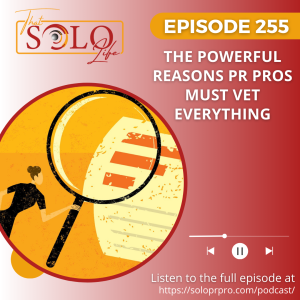
Monday Jun 24, 2024
The Powerful Reasons PR Pros Must Vet Everything
Monday Jun 24, 2024
Monday Jun 24, 2024
That Solo Life, Episode 255: The Powerful Reasons PR Pros Must Vet Everything
In this Episode
In episode 255 of “That Solo Life,” Karen Swim and Michelle Kane discuss the role of vetting in public relations, and the need to thoroughly research clients, client partners, collaborators and more.
The hosts discussed how the recent news of Justin Timberlake's DWI arrest highlighted how one misstep can bring up a person's entire history of mistakes. The incident serves as a reminder of the significance of vigorously researching individuals or organizations before committing to work with them or to work with your clients.
Karen and Michelle emphasize the need for due diligence in researching the history and reputation of any person or organization before entering into a relationship. This also applies to any information that you might share from a third party such as quotes or data studies. PR Pros must be fully informed to protect their consultantices. and clients.
Throughout the episode, the hosts stress the value of preparation and being proactive in anticipating any potential issues that may arise from working with certain clients or partners. Karen and Michelle share personal experiences of discovering problematic histories of individuals they previously supported and the importance of learning from those instances.
Additionally, the hosts discuss the benefits of seeking insights from PR colleagues or industry peers when vetting prospects, as they can provide valuable information and warnings based on their experiences.
Episode Timeline:
- 00:00:00 - Introduction and Weather Chit-Chat
- 00:01:26 - Importance of Vetting Prospects
- 00:02:03 - Learning from Justin Timberlake 's DWI Incident
- 00:03:21 - Being Prepared for Potential Fallout
- 00:04:39 - Second Chances and Being Informed
- 00:06:11 - Impact of Unprepared Responses in Media
- 00:07:20 - Reflecting on Past Mistakes in Sharing Information
- 00:08:18 - Seeking References and Insights from PR Colleagues
- 00:09:46 - Evaluating Opportunities and Self-Reflection
- 00:11:17 - Role of PR in Guarding Against Risk
- 00:11:43 - Wrapping Up and Summer Plans
Enjoyed the episode?
Please leave a review here - even a sentence helps. Share and tag us (@SoloPR, @SoloPRPro) on social media so that we can thank you personally! Your support helps us keep bringing you insightful content every week. Thank you for tuning in!
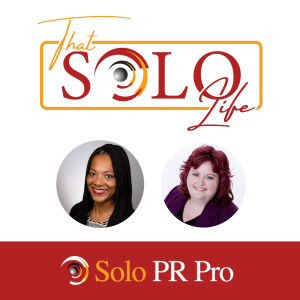
Monday Jun 17, 2024
The Work of Diversity, A Conversation with Anetra Henry
Monday Jun 17, 2024
Monday Jun 17, 2024
That Solo Life, Episode 254: The Work of Diversity - A Conversation with Anetra Henry
In this Episode
Anetra Henry, Senior Director of Strategic Initiatives at the Institute for Public Relations joins Karen Swim, APR and Michelle Kane on today’s episode of “That Solo Life.” Anetra is a passionate storyteller and strategic messaging guru, known for her expertise in research and advocacy for diversity and inclusion.
The episode delved into a recent study, led by Anetra, "Collaborators for Change," which focused on the relationship between Chief Communications Officers (CCOs) and Chief Diversity Officers (CDOs) in organizations. Anetra shared the spark that led to the research, highlighting the importance of understanding how these executives work together, especially during times of crisis.
Anetra discussed the obstacles faced during the study, including challenges in recruiting CDOs due to external factors like legislation targeting diversity initiatives. She emphasized the need for empathy and understanding in conducting the interviews, as participants shared personal stories and fears about the future of their work.
The conversation also touched on key takeaways from the study, such as the importance of clear communication between CCOs and CDOs, the impact of diversity fatigue, and the need for organizations to define and prioritize diversity, equity, and inclusion initiatives.
Anetra shared her personal reflections on conducting the study, highlighting the emotional impact of hearing participants' stories and fears. She emphasized the importance of empathy and the need for continued efforts in diversity and inclusion work.
Looking ahead, Anetra expressed hope for the future of CDOs, emphasizing the importance of continued progress and rebranding of diversity initiatives. She discussed potential future studies and the need for ongoing support and advocacy for diversity and inclusion in organizations.
This episode provided valuable insights into the complex relationship between CCOs and CDOs, highlighting the challenges and opportunities in advancing diversity and inclusion efforts within organizations.
About Anetra Henry
Anetra Henry is not your typical public relations and marketing professional. She's a passionate storyteller and strategic messaging guru. As the Senior Director of Strategic Initiatives at the Institute for Public Relations (IPR), she continues to make waves with her expertise and contributions to research.
Anetra's influence extends beyond her role at IPR. She's a sought-after speaker at industry conferences and events, where she shares her insights and expertise. Through her published articles, thought leadership pieces, and active participation in industry forums, she consistently contributes to the advancement of the field. Her dedication to excellence doesn't stop at the office door. She's a tireless advocate for diversity and inclusion, working hard to create opportunities for underrepresented voices and championing initiatives that foster inclusivity.
Episode Timeline
- Introduction of Anetra Henry : 00:00:14
- Spark for the Collaborators for Change Study : 00:02:21
- Obstacles Faced in Conducting the Study : 00:04:21
- Key Takeaways from the Study : 00:09:35
- Insights into What 's Working and Recommendations for Improvement: 00:15:10
- Personal Impact of Conducting the Research : 00:28:28
- Future of Chief Diversity Officers : 00:34:30
- Possibility of Longitudinal Study : 00:41:06
- Closing Remarks and Thank You : 00:43:19
Resources:
Enjoyed the episode?
Please leave a review here - even a sentence helps. Share and tag us (@SoloPR, @SoloPRPro) on social media so that we can thank you personally! Your support helps us keep bringing you insightful content every week. Thank you for tuning in!
Say Thanks to Anetra Henry!
If you liked this episode with Anetra Henry, please say thanks on LinkedIn or Instagram.
Listen to the episode on our website, Apple Podcasts, Spotify, Amazon Music, or on your favorite podcast platform. You can also watch the interview on YouTube here.
